
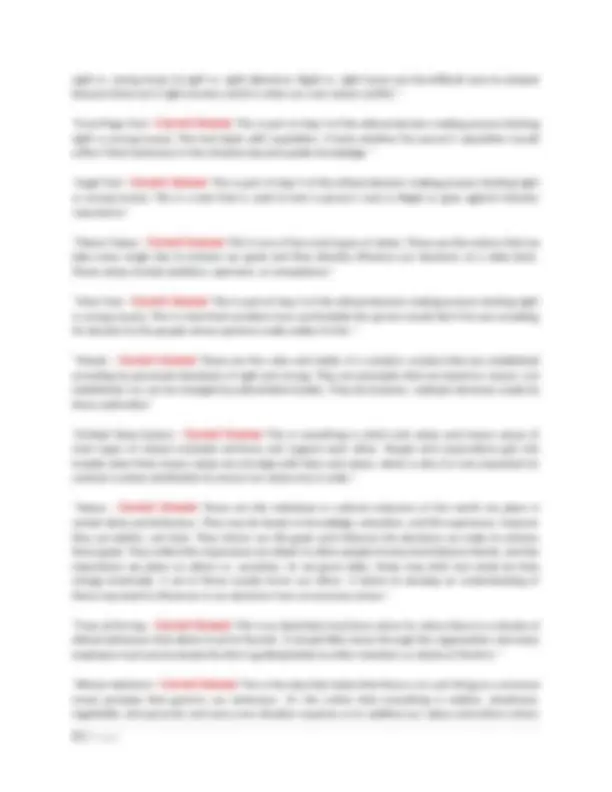
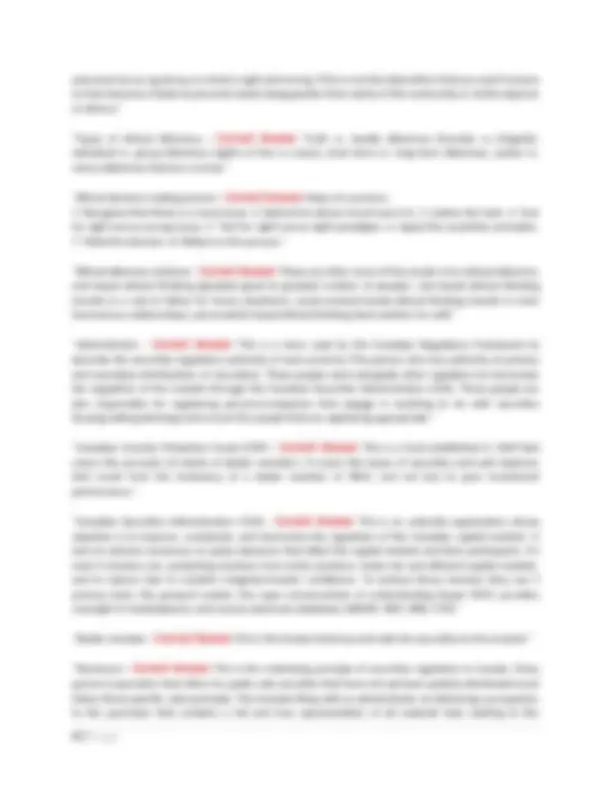
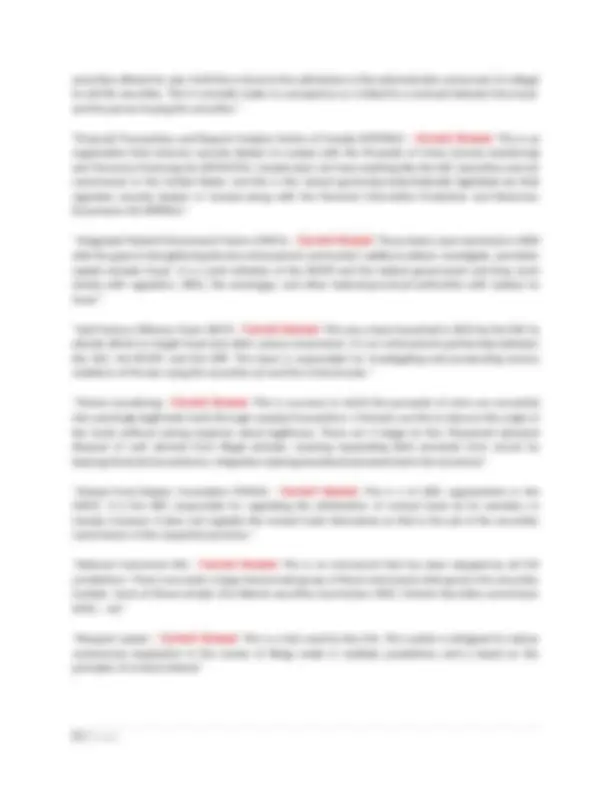
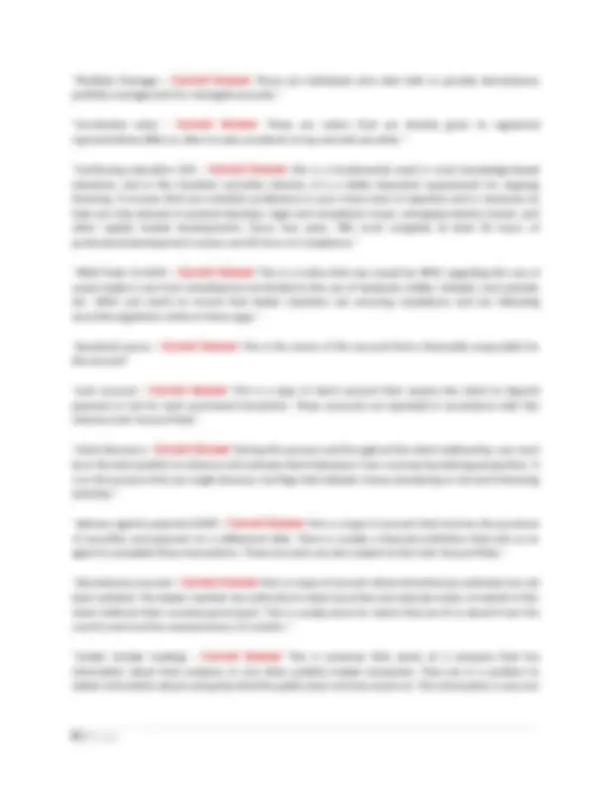
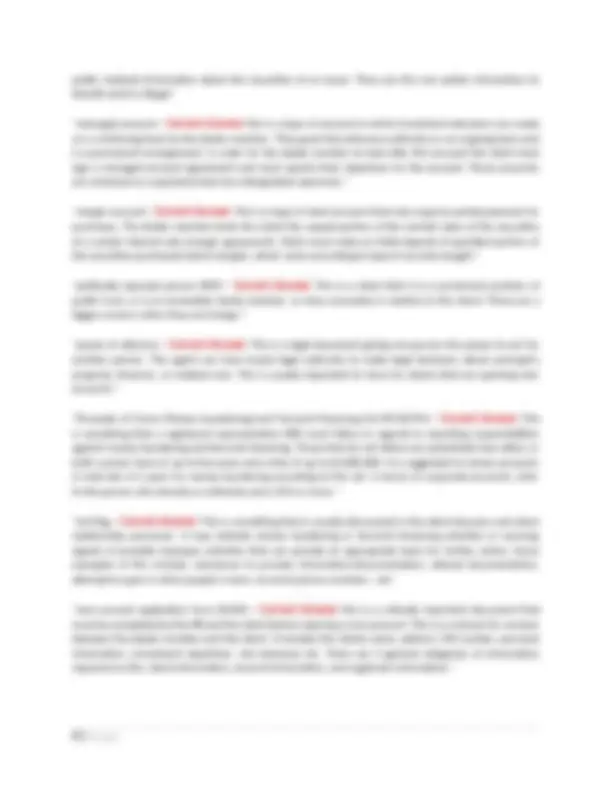
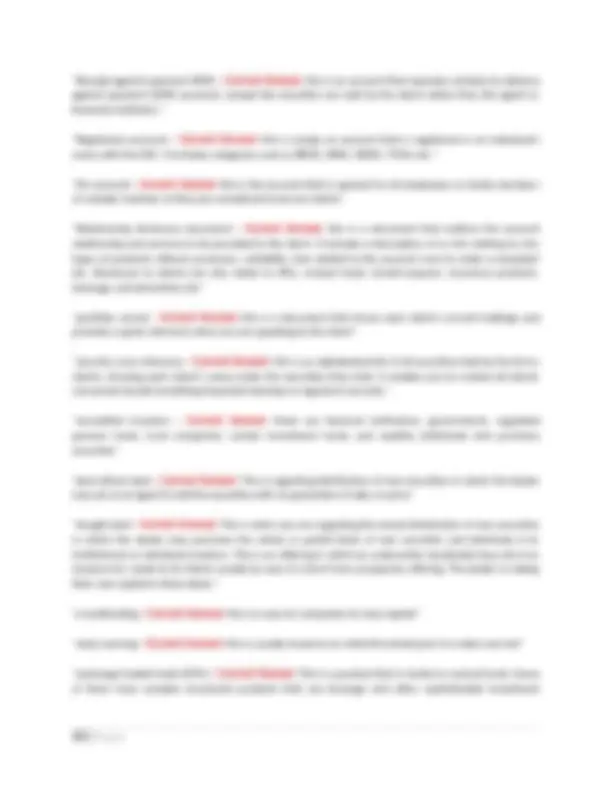
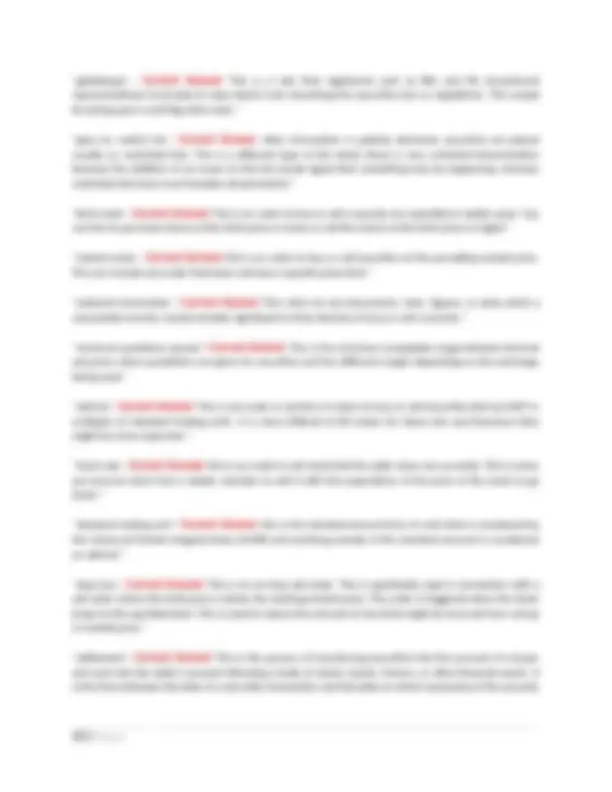
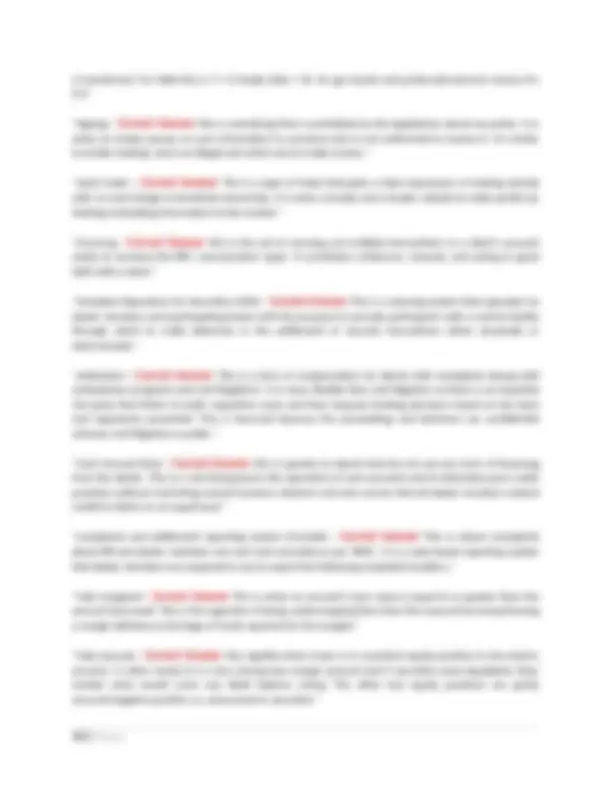
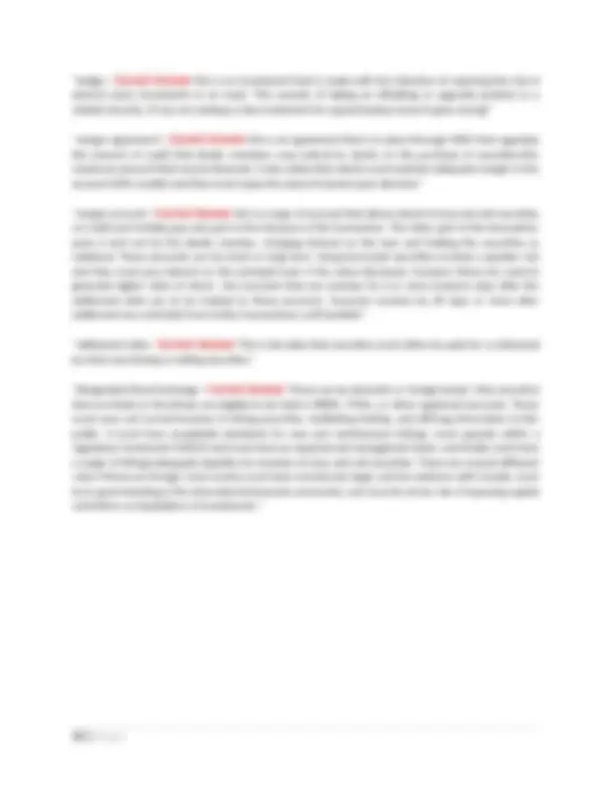


Study with the several resources on Docsity

Earn points by helping other students or get them with a premium plan


Prepare for your exams
Study with the several resources on Docsity

Earn points to download
Earn points by helping other students or get them with a premium plan
Community
Ask the community for help and clear up your study doubts
Discover the best universities in your country according to Docsity users
Free resources
Download our free guides on studying techniques, anxiety management strategies, and thesis advice from Docsity tutors
CONDUCT AND PRACTICES HANDBOOK (CPH) EXAM 136 QUESTIONS WITH ANSWERS,100% CORRECT
Typology: Exams
1 / 15

This page cannot be seen from the preview
Don't miss anything!










(RR) about understanding the products you recommend. Every registered representative (RR) must have this knowledge before recommending the purchase of any investment product to a client. You must understand how it is constructed and how it is likely to perform in various market conditions, as well as how new/non-tradition/complex/structured products function. This is the companion obligation of the KYC."
acting honestly, in good faith, and in a professional manner. This is a requirement to provide advice to clients with those attributes in mind along with the proper skills and knowledge to do so. It is important to note that the standard of care provided is not a standard of perfection. RRs are usually held to this standard much more often than the standard of fiduciary duty. The two aspects of this are suitability and fiduciary duty."
rules and habits of conduct established according to society's perceived standards of right and wrong. In terms of the CPH course, these are a continuous process of examining our choices and making decisions within the context of moral principles. These are important because rules cannot encompass every possible situation that might occur in a day to day business, therefore we need these to help keep everyone held to another standard."
contained within, and growing out of society's overall ethical sensibility. Similar to ethics, these are based on values held by society. Adherence to these allow people to live together creatively rather than destructively."
imposed by common law. It exists in circumstances where one person must place trust in the honest intentions of another person who holds greater authority or expertise. This is not as common as the standard of duty of care. Disputes in regard to this are sometimes resolved through civil litigation where a client was owed a fiduciary duty based on how much they relied on the RR's investment advice/product recommendations."
self regulatory organization that oversees the securities industry. It regulates the actions and behaviour of its Registered Representatives (RRs). It has a strict compliance of rules and regulations and requires that the RR observe high standards of ethics and conduct when transacting business. This is the national SRO overseeing all investment dealers and trading activity on equity and debt marketplaces in Canada."
acceptable counterparties/institutions, regulated entities, registrants under securities law, and a non individual with total securities under administration/management exceeding 10 million."
that ultimately comply with IIROC. This is a rule in IIROC that summarizes IIROC's expectations regarding it's Registered Representative (RR). It states that the RR must be a regulated person (observes high standards of ethics/acts fairly and does not engage in business that is detrimental to public interest) and they must be foregoing any business conduct that is negligent, fails to comply with legal/regulator/contractual obligations/interanal rules and policies, that displays an unreasonable departure from standards, or is likely to diminish investor confidence in the integrity of securities/futures/derivatives."
(RR) about understanding your client's situation before making investment recommendations. This rule implemented by IIROC states that forces you to have an understanding of your client's circumstances and that you must have an understanding their suitability before you can do any business. The dealer member must keep a record of every single client's circumstances and takes notes on the situation. This is the companion obligation of the KYP."
full range of equity and fixed income securities. This is you. The person that is must do all the work with regards to the client and must have all of the certifications and must pass all the tests. These people must observe high standards of ethics and conduct, must understand the client's situation before making investment recommendations (KYC), must understand the products to recommend (KYP), and must act honestly, in good faith, and in a professional manner (duty of care). You must also avoid entering into situations where you interests conflict with those of your client, and you should strive to maintain and improve your professional knowledge in the profession. Finally you must hold all your client's information in the strictest confidence."
and KYP and is directly related to the duty of care. It refers to a client's current financial situation, investment knowledge, investment objectives, time horizon, and risk tolerance. Essentially it is the quality of something being right or appropriate for a particular person, administered by IIROC."
our personal goals for which we strive for, which may be years away. These values include a sense of accomplishment, service to people, security, a world at peace, and social recognition."
and we must make an ethical decision. There are two main categories that these situations fall into;
everyone has an equal say on what is right and wrong. (This is not the ideal ethics that you want humans to have because it leads to personal needs being greater than needs of the community or at the expense of others)"
individual vs. group dilemmas (rights of few vs many), short term vs. long term dilemmas, justice vs. mercy dilemmas (fairness vs love)."
end based ethical thinking (greatest good to greatest number of people), rule based ethical thinking (results in a rule to follow for future situations), social contract based ethical thinking (results in most harmonious relationships), personalistic based ethical thinking (best solution for self)"
describe the securities regulatory authority of each province (The person who has authority of primary and secondary distributions of securities). These people work alongside other regulators to harmonize the regulation of the markets through the Canadian Securities Administrators (CSA). These people are also responsible for registering persons/companies that engage in anything to do with securities (buying/selling/advising) and ensure the people that are registering appropriate."
covers the accounts of clients of dealer members. It covers the losses of securities and cash balances that result from the insolvency of a dealer member of IIROC, but not due to poor investment performance."
objective is to improve, coordinate, and harmonize the regulation of the Canadian capital markets. It aims to achieve consensus on policy decisions that affect the capital markets and their participants. It's main 3 missions are; protecting investors from unfair practices, foster fair and efficient capital markets, and to reduce risks to market's integrity/investor confidence. To achieve those missions they use 3 primary tools; the passport system, the super memorandum of understanding (Super MOU, provides oversight of marketplaces), and various electronic databases (SEDAR, SEDI, NRD, CTO)."
person/corporation that offers for public sale securities that have not yet been publicly distributed must follow these specific rules/principle. This includes filing with an administrator an delivering a prospectus to the purchaser that contains a full and true representation of all material facts relating to the
securities offered for sale. Until this is done to the satisfaction of the administrator concerned, it is illegal to sell the securities. This is normally made in a prospectus or is linked to a contract between the issuer and the person buying the securities."
organization that enforces security dealers to comply with the Proceeds of Crime (money laundering) and Terrorism Financing Act (PCMLTFA). Canada does not have anything like the SEC (securities and act commission) in the United States, but this is the closest governing body/federally legislated act that regulates security dealers in Canada along with the Personal Information Protection and Electronic Documents Act (PIPEDA)."
with the goal of strengthening the law enforcement community's ability to detect, investigate, and deter capital markets fraud. It is a joint initiative of the RCMP and the federal government and they work closely with regulators, SROs, the exchanges, and other federal/provincial authorities with relation to fraud."
elevate efforts to target fraud and other serious misconduct. It is an enforcement partnership between the OSC, the RCMP, and the OPP. This team is responsible for investigating and prosecuting serious violations of the law using the securities act and the criminal code."
into seemingly legitimate funds through complex transactions. Criminals use this to obscure the origin of the funds without raising suspicion about legitimacy. There are 3 stages to this; Placement (physical disposal of cash derived from illegal activity), Layering (separating illicit proceeds from source by layering financial transactions), Integration (placing laundered proceeds back into economy)"
IOSCO. It is the SRO responsible for regulating the distribution of mutual funds by its members in Canada, however it does not regulate the mutual funds themselves as that is the job of the securities commissions in the respective province."
jurisdictions. There now exists a large harmonized group of these instruments that govern the securities markets. Some of these include; the Alberta securities commission (ASC), Ontario Securities commission (OSC) .. etc"
unnecessary duplication in the review of filings made in multiple jurisdictions and is based on the principles of mutual reliance"
similar rules as the NDNCL for the sending of commercial electronic messages (CEMs). It requires businesses to obtain consent to send CEMs such as emails, social media messages etc."
circumstance where the interests of a client and a registrant are inconsistent or divergent to each other. If these are not resolved then they may cause major issues/loss of client."
compliance. These are issues that represent challenges similar to money laundering issues. This is a way to protect against cyber attacks to avoid significant damage to reputation and ability to operate."
representatives. They may either be a sales assistant or this."
established regarding allowable times of day to call clients/nonclients for telemarketing."
individuals seeking IIROC approval or registration under securities legislation. It is an evaluation by registration staff of the applicant's integrity, financial solvency, and competence."
must contain. It is a plain language document containing key information about each class or series of a mutual fund and must be made available on the mutual fund's website. This document must be delivered to investors before they purchase the fund in question. It provides investors with the information they need to make a knowledgeable decision before investing."
categories for individuals employed at a dealer member, alongside Registered Representatives. Both types of representatives must be registered to operate in the geographic location of their clients. They must state the number of hours they work per week and if it is less than 30 they must explain why. These representatives must adhere to IIROC rules as well as applicable provincial securities law. They also must disclose all outside activities that they participate in. These representatives can only take orders from clients from where they are licensed in. (if only licensed in Ontario can only take orders from clients in Ontario)."
of rules for the collection, use, or disclosure of personal information in the course of commercial activities in Canada. It applies to private sector businesses and public that collect use or disclose personal information. It governs what dealer members can do with personal information that is collected used and disclosed in the course of doing business."
portfolio management for managed accounts."
representatives (RRs) or often to sales assistants to buy and sell securities."
industries, and in the Canadian securities industry, it is a vitally important requirement for ongoing licensing. It ensures that you maintain proficiency in your chose area of expertise and is necessary to help you stay abreast of product develops, legal and compliance issues, emerging industry trends, and other capital market developments. Every two years, RRs must complete at least 20 hours of professional development courses and 10 hours of compliance."
social media in any form including but not limited to the use of facebook, twitter, linkedin, and youtube etc. IIROC just wants to ensure that dealer members are ensuring compliance and are following securities legislation while on these apps."
the account"
payment in full for each purchased transaction. These accounts are operated in accordance with the industry Cash Account Rule."
be in the best position to observe and evaluate client behaviour from a money laundering perspective. It is in this process that you might discover red flags that indicate money laundering or terrorist financing activities."
of securities and payment on a settlement date. There is usually a financial institution that acts as an agent to complete these transactions. These accounts are also subject to the Cash Account Rule."
been solicited. The dealer member has authority to select securities and execute orders on behalf of the client (without their constant permission). This is usually done for clients that are ill or absent from the country and must be renewed every 12 months."
information about that company or any other publicly traded companies. They are in a position to obtain information about companies that the public does not have access to. This information is any non
against payment (DAP) accounts, except the securities are sold by the client rather than the agent or financial institution."
name with the CRA. It includes categories such as RRSPs, RRIFs, RESPs, TFSAs etc."
of a dealer member as they are considered to be non clients"
relationship and services to be provided to the client. It includes a description of or info relating to; the types of products offered, processes, suitability, fees related to the account, how to make a complaint etc. Disclosure to clients can also relate to IPOs, mutual funds, bonds/coupons, insurance products, leverage, and derivatives etc"
provides a quick reference when you are speaking to the client"
clients, showing each client's name under the securities they hold. It enables you to contact all clients concerned should something important develop in regards to security."
pension funds, trust companies, certain investment funds, and wealthy individuals who purchase securities"
may act as an agent to sell the securities with no guarantee of sales or price"
in which the dealer may purchase the whole or partial block of new securities and distribute it to institutional or individual investors. This is an offering in which an underwriter (syndicate) buys all of an issuance for resale to its clients usually by way of a short form prospectus offering. The dealer is risking their own capital in these deals."
of them have complex structured products that use leverage and other sophisticated investment
strategies. It is a type of security that tracks an index. People usually buy these because they have low fees or they don't believe that mutual funds will beat the market over time."
restricted to certain individuals and entities who meet certain requirements specified in securities legislation in the province where they reside. It refers to certain securities that are generally considered to be of low risk in terms of loss of capital"
disclosure of all facts pertaining to the offering with regards to the securities being distributed"
the market"
minimum return equal tot he investors initial investment, regardless of the performance of the underlying assets. Sale of these come through registered dealers, including IIROC dealer members."
their clients in the general availability through a statement message, general mailing, or other communications"
This is the investment contract between the purchaser and the company. It outlines certain facts upon which potential purchasers base their decision to buy securities"
have in red ink on its front cover a state to the effect that the preliminary prospectus has been filed, not in its final form, and is subject to completion or amendment. It also states that securities may not be sold, nor may offers to buy them be accepted until a receipt for the final prospectus has been obtained from admin."
marketplace and a prospectus is normally still required"
agreements"
need"
representatives) must play to stop clients from breaching the securities law or regulations. This would be acting upon a red flag when seen."
usually on restricted lists. This is a different type of list where there is very restricted dissemination because the addition of an issuer to this list would signal that something may be happening, whereas restricted lists have much broader dissemination"
use this to purchase shares at the limit price or lower or sell the shares at the limit price or higher"
This can include any order that does not have a specific price limit."
reasonable investor would consider significant to their decision to buy or sell a security."
ask prices when quotations are given for securities and has different ranges depending on the exchange being used."
multiples of standard trading units. It is more difficult to fill orders for these lots and therefore they might be more expensive."
you borrow stock from a dealer member to sell it with the expectation of the price of the stock to go down."
the Universal Market Integrity Rules (UMIR) and anything outside of this standard amount is considered an odd lot."
sell order where the limit price is below the existing market price. The order is triggered when the stock drops to the specified level. This is used to reduce the amount of loss that might be incurred from a drop in market price."
and cash into the seller's account following a trade of stocks, bonds, futures, or other financial assets. It is the time between the date of a securities transaction and the date on which ownership of the security
is transferred. For tbills this is T + 0 (trade date + 0), for goc bonds and preferred/common shares it's t+2"
when an insider passes on such information to someone who is not authorized to receive it. It's similar to insider trading, and is an illegal and unfair way to make money."
with no real change in beneficial ownership. It is when a broker and a trader collude to make profits by feeding misleading information to the market."
solely to increase the RR's remuneration (pay). It constitutes unfairness, honesty, and acting in good faith with a client."
dealer members and participating banks with the purpose to provide participants with a central facility through which to make deliveries in the settlement of security transactions either physically or electronically."
ombudsman programs and civil litigation). It is more flexible than civil litigation as there is an impartial 3rd party that listens to both respective cases and then imposes binding decisions based on the facts and arguments presented. This is favoured because the proceedings and decisions are confidential whereas civil litigation is public."
from the dealer. This is a rule that governs the operation of cash accounts and it eliminates poor credit practices without restricting normal business relations and also ensure that all dealer members extend credit to clients on an equal basis"
about RR and dealer members are sent and recorded as per IIROC. It is a web based reporting system that dealer members are required to use to report the following complaints/matters."
amount borrowed. This is the opposite of being undermargined/less than the amount borrowed/having a margin deficiency (shortage of funds required for the margin)"
account. In other words it is a very strong loan margin account and if securities were liquidated, their market value would cover any debit balance owing. The other two equity positions are partly secured/negative position, or unsecured/no securities"